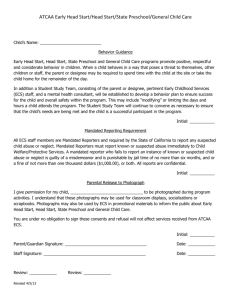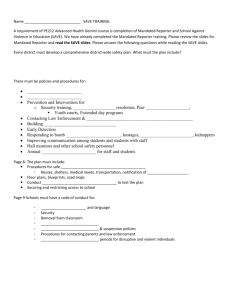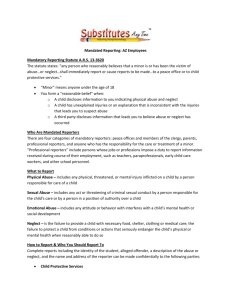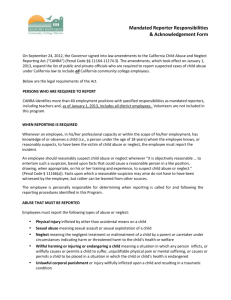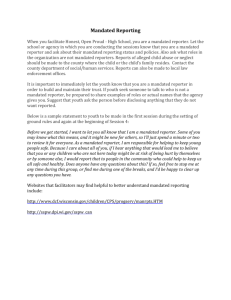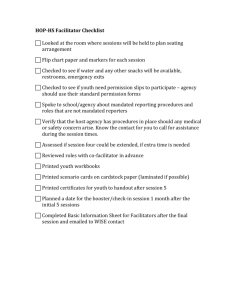UC Policy - CANRA Frequently Asked Questions
advertisement
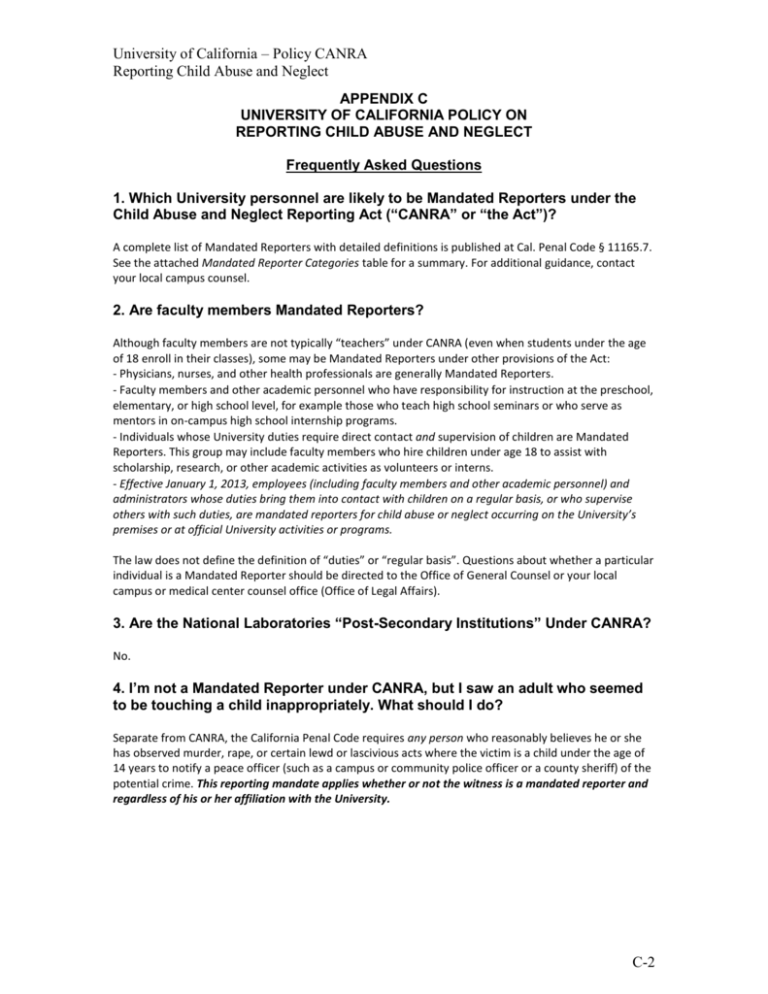
University of California – Policy CANRA Reporting Child Abuse and Neglect APPENDIX C UNIVERSITY OF CALIFORNIA POLICY ON REPORTING CHILD ABUSE AND NEGLECT Frequently Asked Questions 1. Which University personnel are likely to be Mandated Reporters under the Child Abuse and Neglect Reporting Act (“CANRA” or “the Act”)? A complete list of Mandated Reporters with detailed definitions is published at Cal. Penal Code § 11165.7. See the attached Mandated Reporter Categories table for a summary. For additional guidance, contact your local campus counsel. 2. Are faculty members Mandated Reporters? Although faculty members are not typically “teachers” under CANRA (even when students under the age of 18 enroll in their classes), some may be Mandated Reporters under other provisions of the Act: - Physicians, nurses, and other health professionals are generally Mandated Reporters. - Faculty members and other academic personnel who have responsibility for instruction at the preschool, elementary, or high school level, for example those who teach high school seminars or who serve as mentors in on-campus high school internship programs. - Individuals whose University duties require direct contact and supervision of children are Mandated Reporters. This group may include faculty members who hire children under age 18 to assist with scholarship, research, or other academic activities as volunteers or interns. - Effective January 1, 2013, employees (including faculty members and other academic personnel) and administrators whose duties bring them into contact with children on a regular basis, or who supervise others with such duties, are mandated reporters for child abuse or neglect occurring on the University’s premises or at official University activities or programs. The law does not define the definition of “duties” or “regular basis”. Questions about whether a particular individual is a Mandated Reporter should be directed to the Office of General Counsel or your local campus or medical center counsel office (Office of Legal Affairs). 3. Are the National Laboratories “Post-Secondary Institutions” Under CANRA? No. 4. I’m not a Mandated Reporter under CANRA, but I saw an adult who seemed to be touching a child inappropriately. What should I do? Separate from CANRA, the California Penal Code requires any person who reasonably believes he or she has observed murder, rape, or certain lewd or lascivious acts where the victim is a child under the age of 14 years to notify a peace officer (such as a campus or community police officer or a county sheriff) of the potential crime. This reporting mandate applies whether or not the witness is a mandated reporter and regardless of his or her affiliation with the University. C-2 5. Does CANRA or the University Policy on Reporting Child Abuse and Neglect require contractors or volunteers (other than University administrators) to sign certification forms? The certification mandate applies only to employees. However, local campus units may utilize the certification form as a means of notifying volunteers of their statutory obligations and University expectations for reporting. This approach is particularly encouraged for volunteers who serve as University administrators and therefore may be Mandated Reporters effective January 1, 2013; as well as for volunteers who otherwise regularly interact with children through University programs. 6. Do teaching assistants have to sign? Those whose duties bring them into contact with students under the age of 18 on a regular basis must sign. Note that their immediate supervisors would also be considered mandated reporters and, therefore, also must sign. 7. May members of the University community who are not Mandated Reporters make reports about suspected child abuse or neglect directly to law enforcement officials? Yes, and in fact they are encouraged to do so. Anyone may make a report to the appropriate state agency, or to any law enforcement agency, including the University of California Police Department. 8. What is a “reasonable suspicion? “Reasonable suspicion” is defined in CANRA to mean that it is reasonable for a person to suspect abuse or neglect based on the information he or she has and his or her training or experience. It does not require certainty that child abuse or neglect has occurred, nor a specific medical indication of abuse or neglect. 9. What type of conduct is reportable? Child abuse or neglect, including: Physical injury inflicted by other than accidental means. [CANRA § 11165.6] Sexual abuse, meaning sexual assault or sexual exploitation of a child. [CANRA § 11165.1] Neglect, meaning the negligent treatment, lack of treatment, or the maltreatment of a child by a person responsible for the child’s welfare under circumstances indicating harm or threatened harm to the child’s health or welfare. [CANRA § 11165.3] Willful harming or injuring or endangering a child, meaning a situation in which any person inflicts, or willfully causes or permits a child to suffer unjustifiable physical pain or mental suffering, or causes or permits a child to be placed in a situation in which the child or child’s health is endangered. [CANRA § 11165.3] Unlawful corporal punishment or injury willfully inflicted on a child and resulting in a traumatic condition. [CANRA § 11165.4] Child abuse does not include “mutual affray” between minors (e.g., fist-fights); the pregnancy of a minor does not in and of itself constitute a basis for reasonable suspicion of sexual abuse. The following concerns may be reported even absent abuse or neglect: Serious emotional damage or substantial risk of serious emotional damage, evidenced by states of being or behavior including but not limited to severe anxiety, depression, withdrawal, or untoward aggressive behavior toward self or others. For detailed definitions of reportable conduct, please refer to the definitions found in Cal. Penal Code § 11165.1-11165.6. Additional helpful information is available through the Los Angeles County Department of Public Health website. C-3 Note: The duty to report child abuse or neglect supersedes a licensed health professional’s duty to maintain the confidentiality of communications with his or her patients (e.g., the physician-patient or psychotherapist-patient privilege). 10. What information must a Mandated Reporter report? Mandated reports must include name, business address, and telephone number of the mandated reporter, what makes the person a mandated reporter, and the information that gave rise to the reasonable suspicion of child abuse or neglect and the source or sources of that information. The following information, if known, must also be included: child’s name, address, present location and if applicable school, grade, and class; names, addresses, and phone numbers of the child’s parents or guardians; name, address, phone number, and other relevant personal information about the person or persons who might have abused or neglected the child. A mandated report must be made even if some of the above information is unknown or uncertain at the time of the report. Written reports are made on a form designated by the California Attorney General (http://oag.ca.gov/sites/all/files/pdfs/childabuse/ss_8572.pdf). See http://oag.ca.gov/sites/all/files/pdfs/childabuse/8572_instruct.pdf for instructions. 11. When must an external report be made? A Mandated Reporter must make an initial report immediately or as soon as is practicably possible by telephone; and must submit a written follow-up report by mail, fax, or other electronic means within 36 hours of receiving the information about the incident. 12. Does the Act require background checks? No. However, many federal, state and/or accreditation standards require background checks in order to license and/or credential professionals who may also be Mandated Reporters. In the case of policycovered staff employees, Mandated Reporters and other University employees who regularly encounter minors in the course and scope of their employment, work, or studies typically are considered to fill “Critical Positions” and would therefore be subject to background checks pursuant to the Systemwide Guidelines on Designating Critical Positions (attached to PPSM 21). In addition, the University’s sexual misconduct and molestation insurance may not provide coverage if the individual involved was not appropriately fingerprinted and/or underwent the appropriate background checks. 13. What if I am working for the University in another state or outside the United States? CANRA is a California law. Child abuse and neglect identification and reporting laws vary by state, although they tend to impose similar requirements. Information about state laws on child abuse and neglect can be found at http://www.childwelfare.gov/systemwide/laws_policies/state/can/. Employees who would like input on child abuse and neglect reporting laws of another state or those that pertain to their international activities, should contact their local Office of Legal Affairs to obtain advice. C-3 14. Do I have to report potential child abuse or neglect to my supervisor? Any University employee who, regardless of their location, witnesses or otherwise forms a reasonable suspicion of child abuse or neglect while working within the course or scope of their University activities out of state or overseas, must promptly report their concerns to their supervisors or the University compliance hotline. Medical center, student health center, and FSAP employees are exempt from this reporting obligation but must comply with any site-specific policies. 15. We rent our facilities to individuals and organizations that operate programs for children such as conferences, retreats, and day camps. Does the policy apply in those situations? CANRA applies to any mandated reporter and to any employer (such as an independent camp that rents University facilities) of mandated reporters. The University policy on reporting child abuse and neglect applies to University personnel who provide services to those camps. For example, a University employee who provides food services at a camp and thus regularly comes into contact with campers who are children is a Mandated Reporter under this policy, as is his or her immediate supervisor. A volunteer who runs a retreat program for children on behalf of the University is also a Mandated Reporter (an “Official” under the policy). University administrators who are responsible for managing facility rentals for camps or other programs that may bring children onto campus facilities should comply with any contracting standards that may be adopted by the campuses requiring such renters to conduct background checks, comply with CANRA, and promptly report any observed or suspected abuse to appropriate authorities. 16. What happens if a mandated reporter refuses to sign an acknowledgement form? Failure to sign an acknowledgement form required by the law may result in revocation of an offer of employment. In the case of current employees who are required to sign but who have not previously signed, failure to sign when requested may result in a prohibition on contact with minors. This in turn may result in an inability to perform required job functions and, ultimately, disciplinary action up to and including dismissal. 17. What happens if I don’t make a mandatory report? Violation of the University Policy on Reporting Child Abuse and Neglect may result in disciplinary action consistent with applicable University personnel policies and collective bargaining agreements. Violation of the law requiring Mandated Reporters to promptly report suspected child abuse or neglect may result in criminal penalties including fines, imprisonment, or both. 18. Where can I find additional information and resources? California Mandatory Violence Law, Cal. Penal Code §§ 11160-11163.6 Dependent Adults and Elders, Cal. Welfare & Institutions Code § 15630 California Department of Social Services: Hotlines and Other Resources California Department of Justice - Child Abuse Page and Forms and Background Check Information - Bureau of Medi-Cal Fraud & Elder Abuse Mandated Reporter Training: Child Abuse Mandated Reporter Training Project CDC Guide to Preventing Child Abuse Within Youth-Serving Organizations California Attorney General Citizen’s Guide to Preventing Elder Abuse Child Abuse Prevention and Treatment Act Information Clery Act and Information for UC Campus Management 4851-9675-2401, v. 10 C-3
